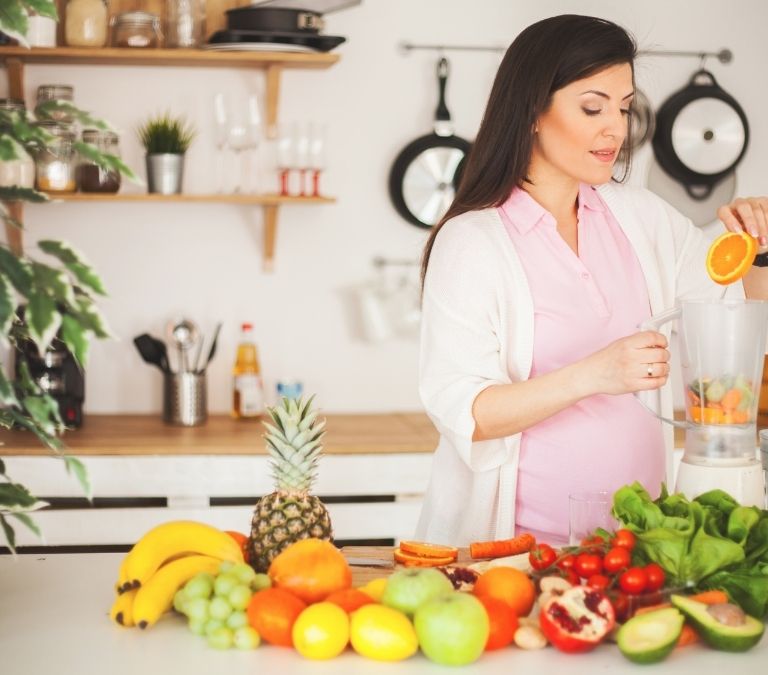You always feel the urge to grab a box of chocolates or a bag of potato chips because that’s the only thing that will make you feel satisfied and happy. It’s okay to crave food sometimes, but in the case of menopausal women, it is an intense food craving.
Most menopausal women experience strong cravings, which may result from hormonal changes.
Eating is nothing wrong, and you shouldn’t be ashamed of your appetite. However, you should know that eating greatly impacts your overall health. This article discusses all you need to know about how menopause can ramp up food cravings and how to stay within healthy limits. Let’s go!
What Causes Extreme Hunger During Menopause?
Perimenopause is the first stage of menopause and is usually called “the change.”
Women usually experience changes in their menstrual cycle over several years before it stops forever. During this stage, there are a lot of changes in the levels of hormones, especially reproductive hormones; this causes menopausal symptoms such as night sweats, vaginal dryness, low libido, anxiety, fatigue, headaches, and joint pains.
These hormonal fluctuations also make you crave foods like never before. Thus, hormonal changes are one of the reasons why you feel like eating everything in the fridge at once.
A small research has shown that most women experience increased hunger and food cravings during menopause transition. The study subjects also reported most women have experienced an increase psychological craving for foods during menopause.
So, if you’re feeling extra hungry during menopause, chill! You aren’t the only one here. This article discusses all you need to know about this experience.
Do Hormones Make You Hungry?
Hormones fluctuate, mood changes, and you become stressed and feel unmotivated to move. All you need is some cupcakes and cookies for the whole day. You know these foods aren’t healthy, but your willpower can’t stop you from going to the kitchen pantry! Oh yes! Your hormones can make you hungry – very hungry.
- Lower levels of estrogen: During perimenopause, women experience drastic fluctuations in estrogen levels as the body prepares to bid goodbye to reproductive years. Eventually, the estrogen levels will start to go down.
Research has linked estrogen with the dampening of appetite. Also, another form of estrogen, estradiol, plays a role in regulating body weight and metabolism. So, as your estrogen levels start to decline during perimenopause, the hormone may not be able to inhibit appetite like before. Therefore, food cravings ramp up.
- Lower levels of leptin: Also known as the ‘satiety hormone,’ leptin is produced by fat cells and regulates energy and inhibits hunger.
When there’s a high level of leptin in the blood, signals are sent to the brain that you’re satisfied and it’s time to stop eating. This helps in maintaining a healthy weight. Recent research has shown that leptin levels are reduced as you age; that’s why perimenopause women feel hungrier.
- High levels of Ghrelin: This hormone is the opposite of the ‘satiety hormone.’ The levels of this hunger-stimulating hormone rise significantly during perimenopause, making you always feel the urge to eat something.
A study has shown that people with high ghrelin levels tend to get hungry easily and have more food cravings.
The hormone is produced in your gastrointestinal tract and sends signals to your brain when the stomach is empty, and there’s a need for a refill. Once you’ve eaten, the levels of ghrelin decrease.
- High levels of Cortisol: The stress hormone ‘cortisol’ is a steroidal hormone produced by the adrenal system in response to stress. The mid-life stage comes with many responsibilities that can lead to stress, thus causing an increase in cortisol levels. Also, the dampening effects of cortisol are inhibited since estrogen levels have also gone low. This leads to a more stress-fueled appetite among menopausal women.
Fatigue and Carb Cravings – Is there a Connection?
Chronic fatigue is one of the common symptoms of menopause. When you’re exhausted, the body searches for means of energy, especially carbs and sugars that can be readily turned into fuel. This is why you crave nothing other than sugars and carbs when you’re extremely tired.
Just like most of the symptoms of menopause, fatigue is caused by changes in hormone levels during this transition stage. Don’t be hard on yourself; it’s best if you relax and take it easy. Allow your body to take time and adjust to the changes in hormonal levels.
But then, how’s fatigue related to sugar cravings?
Once depleted, the body searches for fuel to convert into energy. Sugars and carbs are the forms of foods that are easily converted into that fuel. Because of this, you always feel an increased urge to take sugary foods when exhausted.
These sugars and carbs boost the levels of serotonin in the short term. Serotonin is an indoleamine neurotransmitter involved in appetite, sense of well-being, and depression.
After a short term, the serotonin levels go down again, leading to more carbs and cravings, and the cycle continues.
Mood Changes and Menopause Carbs Craving
During perimenopause, estrogen and serotonin levels are low, causing an increased urge to grab a box of cookies or sweets. Stress-fueled appetite has also been linked to adrenal imbalance.
That’s not all. During perimenopause, many women experience frequent mood changes. No matter how you try, sometimes you’ll get pissed off over the smallest thing.
It’s not you; it’s the hormones! Fluctuations in the levels of reproductive hormones make you overwhelmed or pissed off in situations you usually handle gently.
Studies have shown that hormone changes affect the neurotransmitters in charge of mood and emotions, such as dopamine and serotonin.
So, while you’re thinking that taking a carb is the only way to quickly fix your energy, all it does is gets your sugar high up and, in a few moments, get it down.
Foods To Avoid During Menopause
During menopause, the body goes through a hormonal transition that affects women in many ways. From hot flashes to weight gain and carbs craving. You can relieve all these by taking the right foods and avoiding the wrong ones.
Below is a list of foods to avoid at all costs during menopause:
Caffeine
Can’t you do without your morning cup of Joe? Well, it could be worsening your menopause symptoms. A study by the Mayo Clinic Journal of Menopause has revealed that women who take a lot of caffeine are more likely to experience hot flashes than women who don’t consume caffeine.
We aren’t saying you should cut off caffeine completely. Consuming it in moderate amounts won’t harm you. For example – consuming a cup of coffee daily doesn’t have many side effects.
Unfortunately, most Americans consume much more than the recommended amount of caffeine.
Coffee shops are on corners of every city, almost all offices have coffee machines and beverages, and sodas containing caffeine are also consumed in high amounts.
That chocolate ice cream or pudding you take in the evenings probably contains caffeine. Even some pain reliever drugs contain caffeine which hastens relief but not when you’re trying to relieve menopause symptoms. Why? Excess caffeine worsens vasomotor menopause symptoms such as night sweats and hot flashes caused by dilation or constriction of blood vessels.
Don’t worry; we have an alternative for you – whenever you feel like taking a hot cup of Joe, grab a cup of peppermint or green tea. If you’re exhausted and want a kick-up, go for a walk instead of taking caffeine.
Fatty Foods
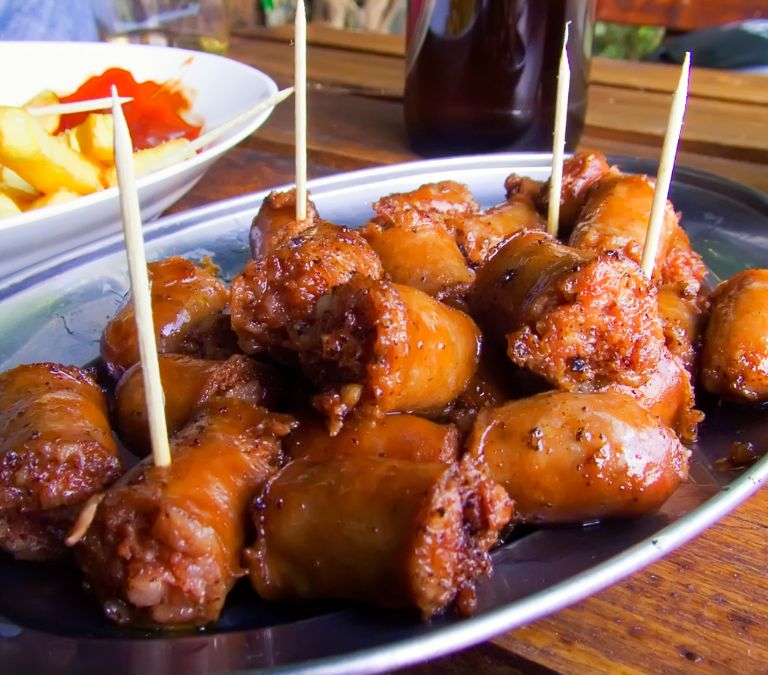
Coming back from work hungry and too exhausted, drive-in restaurants may be an easy way to grab a meal, but their meal usually contains massive amounts of fats.
According to the American Heart Association, Consuming fatty foods increases your risk of cardiovascular diseases, which is already high in women that have passed menopause. Fatty foods have also been linked to weight gain, worsening menopause symptoms like night sweats and joint pain.
Is there a better solution? Pack a healthy lunch to work, or freeze leftovers when you get home. Always satisfy your cravings for healthy foods – try a grilled chicken sandwich with some veggies.
Processed Foods
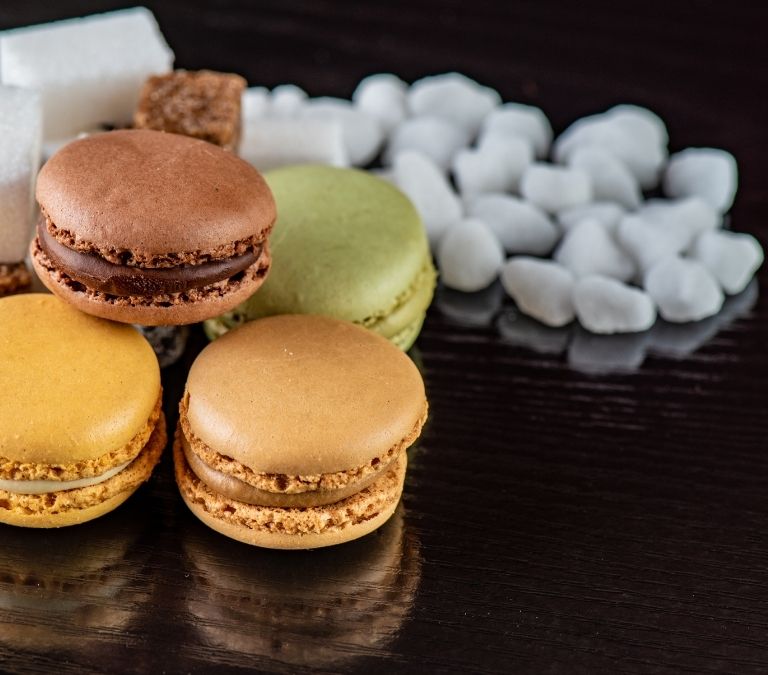
It would be best to avoid burgers, donuts, pizzas, chips, and all other foods packed in plastic wrappers or bags. We agree these foods are delicious but not friendly to your health.
They belong to a part of the processed foods category the Department of Agriculture specifies as “raw agricultural products that have been subjected to washing, milling, chopping, cooking, canning, freezing, drying, pasteurizing, dehydrating, packaging and other processes that change the food from its natural state.
The list is too long that we can’t mention it all! Just follow this rule of thumb – eat close to their natural states.
Processed foods contain high levels of sodium and sugar that can excavate menopause symptoms like bloating, inflammation, and weight gain.
Here are some better alternatives – whole grain crackers dipped in peanuts, butter, string cheese, and fruits, especially carrots and apples. These will satisfy your cravings and provide essential nutrients without worsening your menopause symptoms.
Sugary Foods
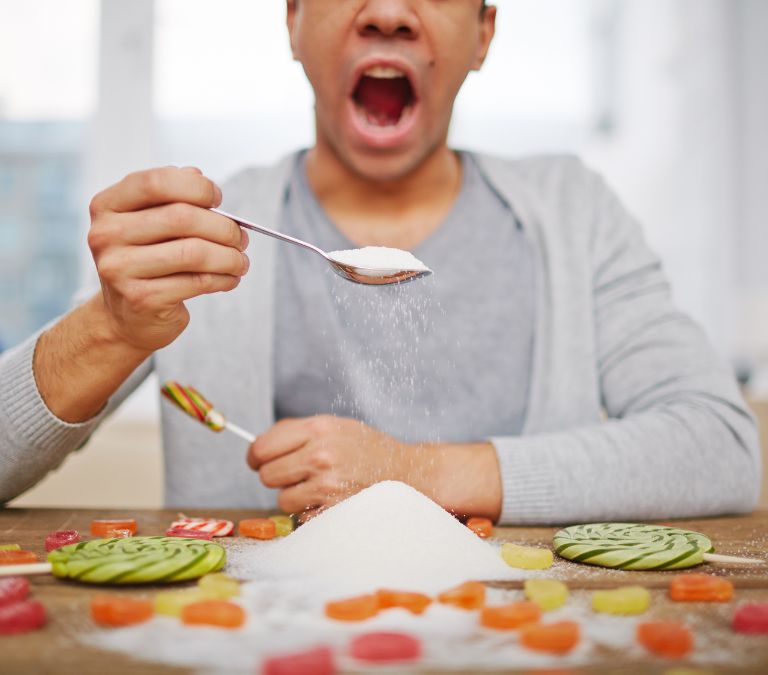
Avoid foods containing processed sugars. We aren’t talking about natural sugar in fruits but artificial sugars in processed food and beverages.
These foods raise blood sugar levels, leading to more intense night sweats and hot flashes.
It can be hard to track the amount of sugar you’re consuming because there are several names for sugars on food labels. It’s not bad if you do a little research to know the most harmful white stuff and how to avoid it.
Refined Carbs
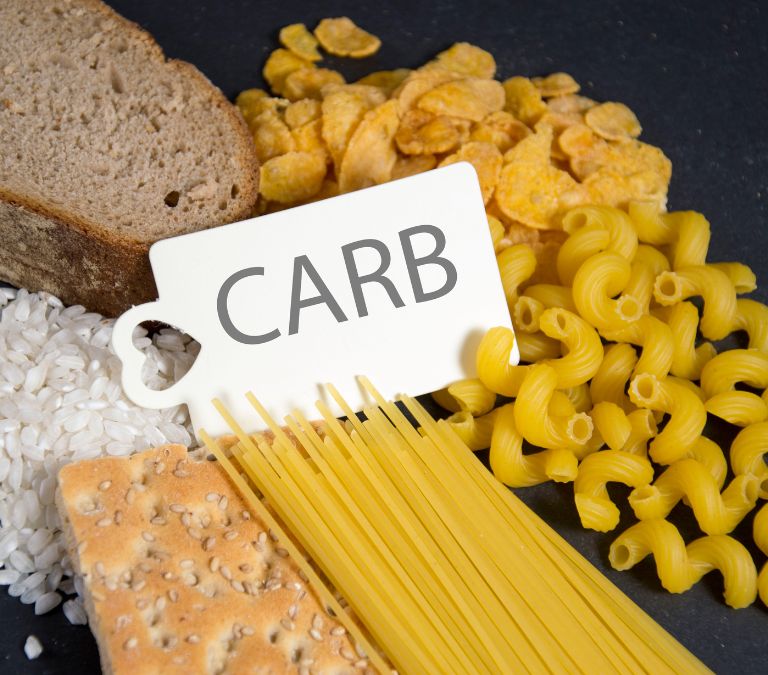
White pasta might be your favorite lunch, but your body doesn’t welcome those carbs during menopause.
During perimenopause, women experience a slow down in their metabolism leading to the body processing carbs in a different form. Excess consumption of starchy carbs might be behind the extra pounds you add.
White pasta, white rice, potatoes, and white bread have increased blood sugar levels and insulin resistance, thus leading to intense hot flashes.
Replace these foods with whole grains like brown bread and brown rice and watch for the unwanted menopause weight gain will disappear.
Alcohol
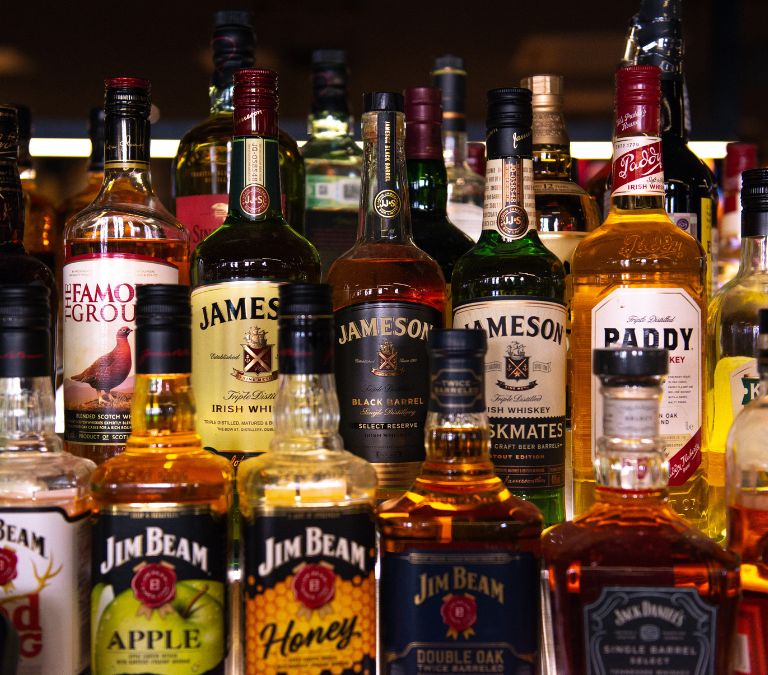
Many have become so used to drinking that they can’t imagine celebrating happy hours with friends without a glass of beer or wine.
While drinking alcohol in moderation might be too harmful, it can ramp up menopause symptoms such as hot flashes, headaches, night sweats, and mood swings. It can even lead to depression if you’re drinking heavily.
Experts recommend menopausal women shouldn’t take more than one drink of alcohol daily. This is equivalent to 12oz of beer or 5oz of wine. Anything more than that will worsen hot flashes and mood swings. Also, studies have shown that women who consume too much alcohol are more prone to excess weight gain and depression at menopause.
Spicy Foods

We understand menopause is making you crave some heat food, but your body
wouldn’t be too happy to have that.
Spicy foods can cause flushing, sweating, and other symptoms of hot flashes. So, if you’re already experiencing menopausal hot flashes and night sweats, it wouldn’t be a good idea to consume food that contains a lot of peppers.
Get rid of those, and spice up your foods with herbs and spices that aren’t peppery such as basil, curry, thyme, and garlic.
Fatty Meats
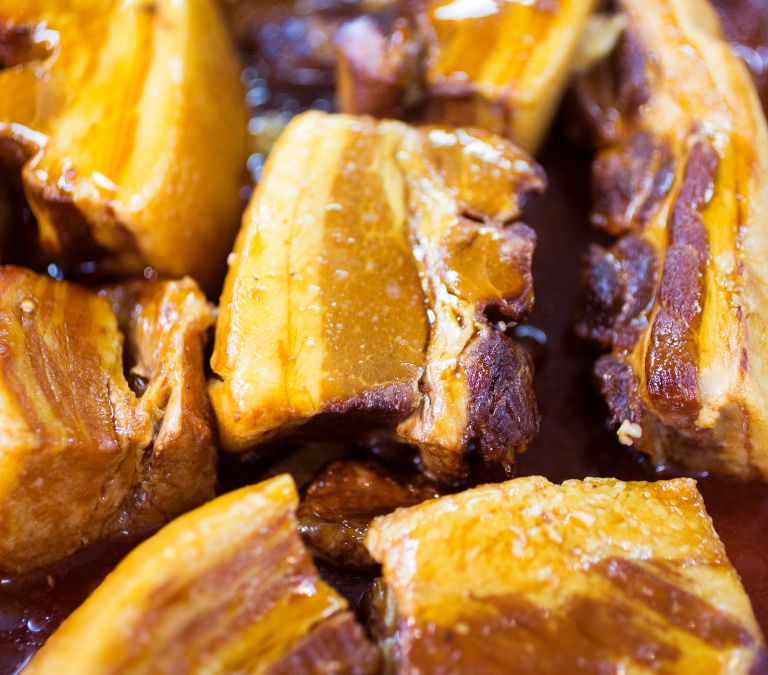
It’s a known fact that fatty meats contain a lot of unhealthy and saturated fats that can lead to many health conditions, including heart disease and excess weight gain.
Fatty meats also lower serotonin levels in menopausal women leading to mood swings and irritation over the slightest issue.
Let go of that bacon and marbled steak, and eat lean meats like turkey or chicken.
Conventional Meat
Meat that comes from animals that spent their early life grazing but were later fed with artificial hormones and grains should also be avoided. The scientifically formulated hormones in conventional beef can cause inflammation in menopausal women.
Always go for organic meat, and poultry 100% naturally grazed without added hormones.
10 Ways to Deal With Food Cravings During Menopause
Surely you know that carbs and sugars aren’t good for your health. But how can you combat your cravings? That’s what we have for you down below.
Tip 1: Stay Hydrated
At times you feel hungry a few hours after a sumptuous meal. In most cases, it’s a sign that your body needs to get more hydrated rather than food. Don’t grab a box of potato chips; take a cup of water, orange juice, or green tea.
Healthy liquids will hydrate your body, help flush out toxins, and satisfy your cravings. Avoid sugary drinks, sodas, and alcohol, as they aren’t a good way to hydrate your body.
Water is good for your body, skin, and brain. It also makes you full. If you find drinking regular water boring and need some flavor, you can add slices of cucumber or like in your water.
Tip 2: Take more Complex Carbs
You must have read somewhere that carbs aren’t good for our health and contribute to weight gain. Here’s some good news! Not all carbs are bad. Refined carbs are bad eggs in white rice, white bread, pasta, potato chips, and ice creams. They’re easily absorbed into the blood, thus causing the blood sugar levels to go up.
On the other hand, we have complex carbs as the good guys. They are good for your health and can be found in whole grains, brown bread, and sweet potatoes. These foods are absorbed into the blood slower and keep you full for a long time.
You can stay away from carbs completely, but you must choose the ones.
Tip 3: Eat A Healthy Diet
Eating a healthy diet is the foundation of a healthy body. There’s no way the body can function properly except if it is well nourished. If you’re not eating a healthy diet, your immune system will be low; you’ll be less energetic and be craving sugary and carb foods.
So make sure you load up on vegetables that are low on calories but high on fiber. These veggies supply your body with essential nutrients and help you maintain a healthy weight.
High-fiber foods should also be included in your diet. They keep you full for a long time and are good for women that frequently experience constipation.
What more? Get enough healthy proteins. They provide you with nutrients and keep you satisfied for a long time.
Tip 4: Go For Natural Sugar
While refined sugars in packaged and processed foods harm your health, that’s not the case with fruits and vegetable sugars, as they’re very good for your health.
Bananas, watermelon, papaya, apples, grapes, oranges, dates, and berries are a few sweet fruits you can take to combat sugar cravings. Whenever you feel like grabbing cupcakes, take an apple instead. Even if not for anything, an apple daily keeps a doctor away.
Eating natural fruits also boost sugar levels, but mildly, unlike artificial sugars. Avoid taking honey or maple syrup alone, while they are healthy sweeteners. Eating them without other food can threaten your blood sugar. Always consume healthy sweeteners with fats or proteins.
Tip 5: Keep Yourself Engaged
Spending the whole day on the couch will make you crave more sugars and carbs. How many times do you visit the pantry when you’re busy? And how many times do you visit it when you’re doing nothing?
Even if you’ve nothing to do, go for a walk or develop a hobby to keep yourself busy. You can try knitting, painting, playing piano, gardening, or anything that will keep you engaged.
Take a cup of coconut water or herbal tea instead of soda if your craving arises at work. Also, stay inside the kitchen if you’re not doing anything there because it will be hard to resist those foods right before you.
Tip 6: Exercise Regularly
One of the best ways to balance your blood sugar levels of by being physically active. Not only that, exercising keeps your mood elevated, and makes you feel energetic, which can help balance hormones and combat sugar cravings.
Exercise for at least 3 minutes thrice a week. It provides menopausal women with many benefits, including controlling weight and reducing the risks of some health conditions.
It doesn’t have to be an extreme activity that will get you sweating. Taking 30 minutes to walk with your dog or jogging in the morning can do the magic.
Tip 7: Get Rid of Sugary Foods and Pay Attention to Labels
Get rid of all the sugary and refined carbs foods in your kitchen. It’s said, ‘out of sight, out of mind.’ If you don’t have that food readily available in your kitchen, you’re less likely to crave them. Consider loading up your fridge with fruits, vegetables, and whole grains.
Whenever you go shopping, keep an eye on the ingredient list of any item before adding it to your cart. Ingredients ending with ‘ose’ are mostly sugars, and also check out for high fructose corn syrup.
Tip 8: Be Friendly To Your Liver
Your liver is the most workaholic organ in your body; it’s always working hard to keep you alive and healthy. It detoxifies your body by filtering out all the toxins you consume and helps in balancing blood sugar hormones and many other functions.
You also have a role to play. Be tender to your liver by not taking too much alcohol and other toxins so that it will be able to function effectively.
Tip 9: Your Emotions Might be the Culprit
There are many reasons we crave sugary items other than hunger and thirst. Some women see sugar foods as a way to relax, celebrate good news, or cool down when annoyed.
Check out your emotions and get to know how they’re related to your sugar cravings. Knowing the real cause of your cravings is one of the most effective ways to kick it off.
Tip 10: Take Probiotics
When the gut and vaginal flora biome is out of balance, unhealthy bacteria and yeast start to grow.
This can lead to food cravings and serious digestive issues. The unhealthy bacteria also feed on artificial sugars and refined carbs, so if you’re using these to satisfy your cravings, you are only excavating the imbalance.
Consider taking probiotics to maintain a bacterial balance and satisfy your cravings. Some foods rich in probiotics include kimchi, kombucha, and yogurt.

